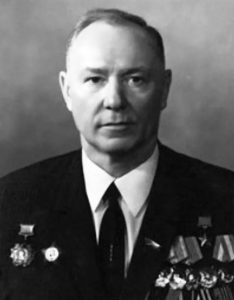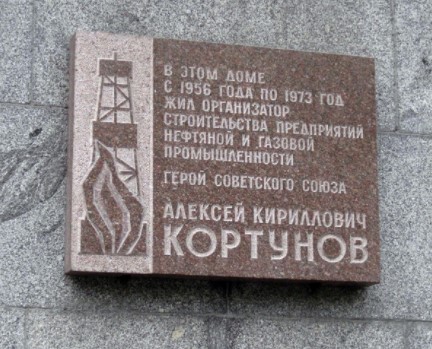Alexey Kirillovich
Kortunov
1907-1973

Alexey Kirillovich Kortunov was Commander of the 629th Rifle Regiment of the 134th Rifle Division of the 69th Army of the 1st Belorussian Front, colonel. He was born on March 15 (28), 1907 in the city of Novocherkassk, Donskoy Army region (now it is in Rostov Region), in a worker’s family. . He was member of the CPSU (b)/CPSU since 1939. In 1931 he graduated from the North Caucasus Institute of Water Management and Land Reclamation, in 1933 he completed postgraduate studies at the All-Union Research Institute of Hydraulic Engineering and Land Reclamation in Moscow. Since 1933 he worked on the construction of the Azovstal metallurgical plant in the city of Mariupol of the Ukrainian SSR. He had been in the Red Army since 1938. He served at the Central Aerohydrodynamic Institute as an engineer, then became the head of the construction of airfield complexes. Immediately after the outbreak of the Great Patriotic War, he submitted a report on the direction to the active army, but due to the lack of military education, he was sent to Military Engineering courses. Since 1942 he had been at the front, head of the engineering service of the 134th Infantry Division, in March 1943 became the commander of the regiment. He distinguished himself in the Belarusian offensive operation. Commander of the 629th Rifle Regiment (134th Rifle Division, 69th Army, 1st Belorussian Front) Colonel A.K. On the night of July 29, 1944, Kortunov crossed the Vistula River as part of an advanced detachment using improvised means. Without waiting for the whole regiment to cross the river, he organized an offensive on the settlement of Lucimia, 18 kilometers southwest of the Polish city of Pulava, and captured it. On July 29, 1944, the soldiers of the 629th Infantry Regiment repelled 11 counterattacks by superior enemy forces and on August 2, 1944, expanded the occupied bridgehead. In these battles, the regiment under the command of A.K. Kortunov destroyed over a thousand enemy soldiers, 6 tanks, 7 assault guns, and captured 5 warehouses. By the decree of the Presidium of the Supreme Soviet of the USSR dated March 24, 1945, Colonel Alexey Kirillovich Kortunov was awarded the title of Hero of the Soviet Union with the award of the Order of Lenin and the Gold Star medal for exemplary performance of combat missions of the command at the front of the fight against the German invaders and his bravery and heroism. Since July 1945 he had been Head of the military Department of the Soviet Military Administration of the Land of Thuringia in Germany. Since September 1948, Colonel A.K.Kortunov had been in reserve. In 1948-1950 he was the head of the Tuymazinsky Territorial Construction Department of Glavneftegazstroy under the Council of Ministers of the USSR. In 1950-1953 he was Deputy Minister of the Oil Industry of the USSR, in 1953-1954 he was Head of the Main Directorate for Construction in the Eastern Regions, in 1954-1955 – Head of the Main Directorate of Oilfield Construction of the Ministry of Oil Industry of the USSR. In February – May 1955 – Deputy Minister of Construction of Oil Industry Enterprises of the USSR. From May 25, 1955 to May 10, 1957, he was Minister of Construction of Oil Industry Enterprises of the USSR. From May 1957 to March 1963, he was Head of the Main Department of the Gas Industry under the Council of Ministers of the USSR (simultaneously from October 1961 to March 1963 – Minister of the USSR). From March 1963 to October 1965, he was Chairman of the State Production Committee for the Gas Industry of the USSR – Minister of the USSR. From October 2, 1965 to September 20, 1972, he was Minister of the Gas Industry of the USSR. Since September 20, 1972 he was Minister of Construction of Oil and Gas Industry Enterprises of the USSR. He contributed to the transformation of the gas industry of the USSR into a powerful branch of the national economy and its entry into the world energy market. He supervised the commissioning of the oil and gas complexes of Bashkiria and Tatarstan, the construction of the Dashava–Kiev–Bryansk–Moscow and Stavropol–Moscow gas pipelines. He supported advanced methods and technologies in the development of deposits in Western Siberia, including the complex-block construction method.
Address: Moscow, Tverskaya str., 8, bldg. 2

